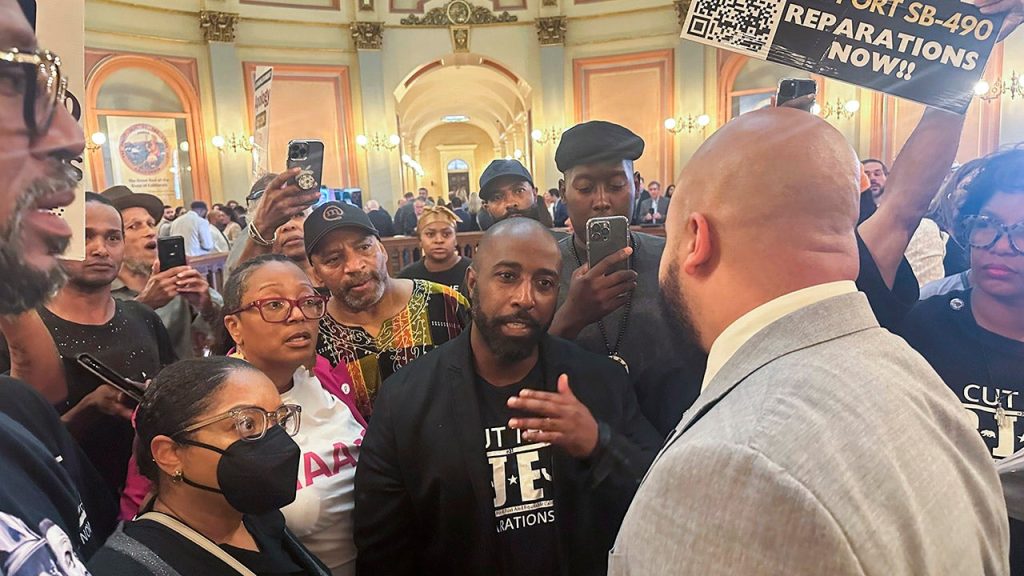The fight for reparations in California continues, with activists hoping to revive two shelved bills during an upcoming special legislative session. These bills, SB 1403 and SB 1331, aimed to establish a dedicated agency and fund to oversee and implement reparations programs, respectively. Proponents argue that these measures are crucial to addressing the enduring legacy of racist policies that have created systemic disparities for Black Californians in areas such as housing, education, and healthcare. However, the bills failed to advance earlier this year, a setback attributed to political considerations, particularly the perceived need to avoid appearing overly progressive during an election year. Reparations Task Force Chair Kamilah Moore expressed frustration with the decision, suggesting that political calculations by Governor Gavin Newsom and concerns about electability overshadowed the merits of the legislation.
The failure of these bills represents a significant roadblock for the California Reparations Task Force, which was established to develop proposals for atoning for the historical injustices of slavery and its ongoing impact. While the California legislature passed several bills addressing racial injustices, none directly addressed the issue of reparations through direct payments to African Americans. This distinction has become a central point of contention, with proponents emphasizing the need for tangible financial redress. Moore pointed to perceived inconsistencies in the legislature’s approach, highlighting a letter from the California Legislative Black Caucus that initially supported funding for the reparations agency but later reversed course, contributing to the demise of the legislation.
Former Senator Steven Bradford echoed Moore’s sentiment, asserting that the bills were pulled due to concerns about securing Governor Newsom’s approval. Bradford emphasized the moral obligation to advance reparations legislation and urged reconsideration. The shelving of the bills sparked protests at the state capitol, with demonstrators expressing outrage at the broken promise of legislative action. Assemblyman Bill Essayli, a Republican, criticized Democrats for their handling of the issue, accusing them of avoiding a vote despite years of pronouncements about reparations. While opposing reparations funded by California taxpayers, Essayli advocated for open debate and a recorded vote on the matter.
The debate over reparations in California touches on fundamental questions of racial justice, historical responsibility, and the best approach to addressing persistent inequalities. While proponents argue for direct financial payments as a necessary form of redress, opponents raise concerns about the constitutionality and practicality of race-based compensation. Alternative approaches, such as targeted investments in minority communities through initiatives like opportunity zones, have been suggested as more effective means of fostering economic empowerment and addressing historical disadvantages. The ongoing debate highlights the complex and often contentious nature of discussions surrounding reparations, reflecting deeply held beliefs about the role of government in rectifying past injustices.
Two new reparations bills, AB 7 and AB 57, have been introduced during a recent special legislative session. AB 7 proposes allowing California’s higher education institutions to consider giving admissions preference to descendants of American slavery, while AB 57 seeks to allocate a portion of home purchase assistance funds to this same group. These bills represent a renewed effort to address the legacy of slavery in California, focusing on education and housing as key areas for intervention. Governor Newsom’s stance on these specific bills remains unclear, though his previous actions offer a mixed picture. While he approved a substantial budget that includes funding for reparations, he has not explicitly endorsed direct payments and has expressed reservations about certain proposals.
Governor Newsom’s signing of a formal apology for California’s historical role in perpetuating slavery and its persistent legacy adds another layer to the complex landscape of reparations in the state. While this symbolic gesture acknowledges past injustices, it stops short of endorsing direct financial compensation. The interplay between symbolic recognition of historical wrongs and concrete policy measures aimed at addressing present inequalities remains a central tension in the ongoing reparations debate. The future of reparations in California will depend on the legislative fate of the newly introduced bills, the evolving political landscape, and continued advocacy by those pushing for meaningful redress for the historical injustices faced by Black Californians. The coming months will be crucial in determining the direction of this important and emotionally charged debate.










